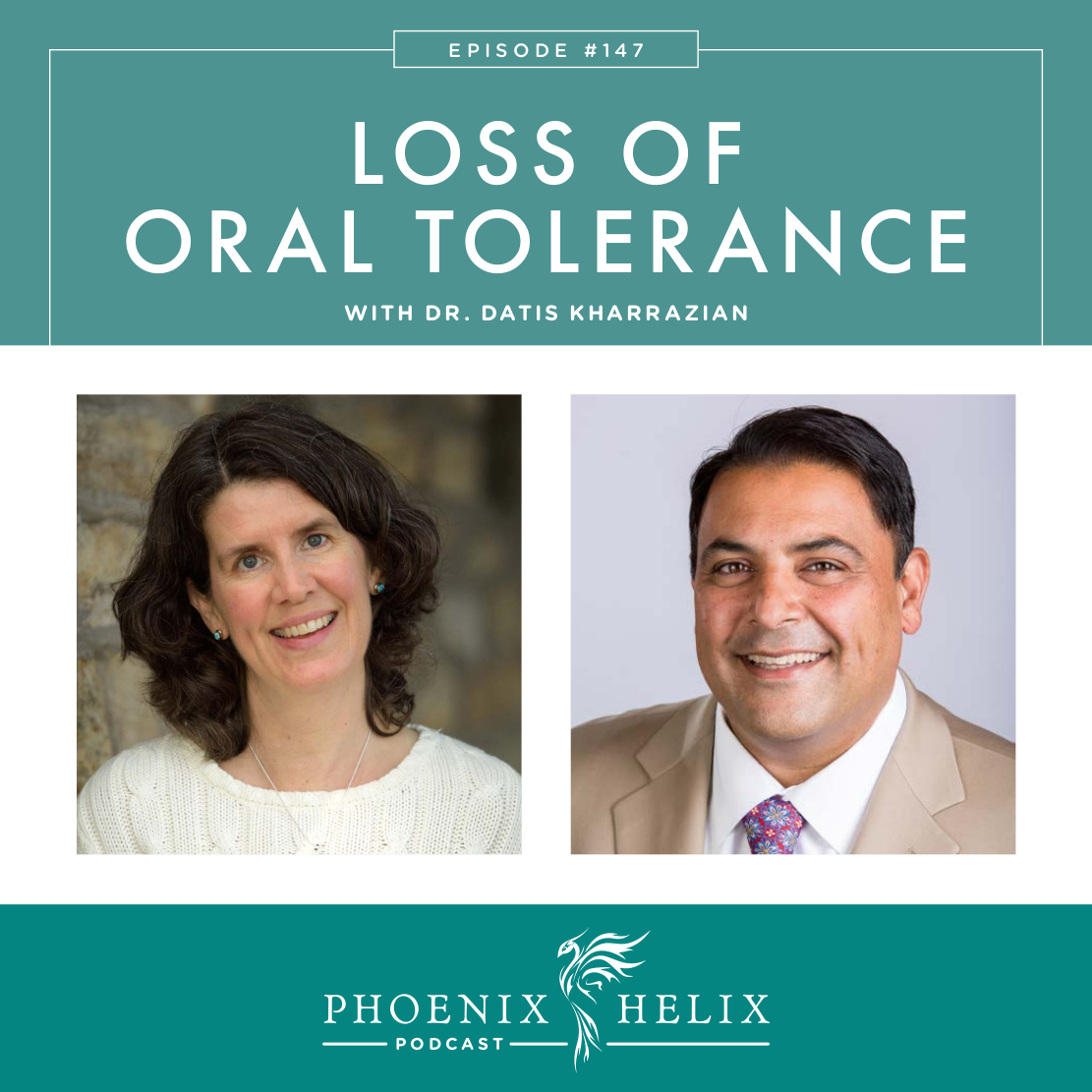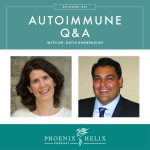
When the Body Becomes Hypersensitive to Food
Have you ever wondered why after developing autoimmune disease, you suddenly start reacting to foods that never bothered you before? That’s because autoimmune disease signals a change a in your immune system, and this change affects other things as well, including your body’s response to certain foods. That’s one of the reasons the Paleo Autoimmune Protocol can be so beneficial. It helps us identify and avoid common food triggers. But the elimination phase is meant to be short-term. During the reintroduction process, most people are able to reintroduce some foods successfully and end up with a short list of specific foods to avoid. That’s how we personalize our own healing diets. But what if the opposite happens and every reintroduction fails? Not only that, but you seem to become sensitive to all foods, even those allowed on the AIP? This is called Loss of Oral Tolerance, and that’s what this podcast is all about. My guest is Dr. Datis Kharrazian, a leader in the autoimmune community and expert on this issue. We’re going to discuss the root causes behind this overreaction to food, and also solutions to help people heal and expand their tolerance again.
Listen to the Show
- Subscribe to my podcast through your favorite podcast app: iTunes, Stitcher, Google, TuneIn, Spotify, Amazon, etc.
- You can also listen to the episode right here through the player below, and if you subscribe to my newsletter you’ll get notified of future episodes.
Podcast: Play in new window | Download
Show Notes
- Intro (0:00)
- Thank You to Our Podcast Sponsor: ShopAIP (3:50)
- Gelatin and Collagen are healing foods recommended on the paleo autoimmune protocol, because they are building blocks for tissues throughout the body. They help repair leaky gut, support joint health, improve liver function, support weight management, and also strengthen hair, skin, nails, and bone. You can see why they’re recommended! So, what’s the difference between them? Their health benefits are the same, but their use in recipes is quite different. Gelatin has “gelling” properties, so it’s used in recipes like juice jello, homemade gummy candies, and gelatin eggs (used in AIP baking). Collagen doesn’t gel; instead, it dissolves in liquid. So, it’s often added to smoothies or stirred into beverages to get more collagen in your diet. ShopAIP sells a high-quality, grass-fed brand: Great Lakes.
- ShopAIP is an online store dedicated to the Paleo Autoimmune Protocol. With hundreds of items for the elimination phase of the AIP, and new products labeled by reintroduction category as well. You can find protein bars, sauces and condiments, AIP-friendly spices, cooking and baking ingredients, delicious snacks, non-toxic skincare, and more.
- If you’re a first-time customer, use the code PHOENIX for 10% off your order. Purchase here.
- Meet Dr. Kharrazian (5:52)
- Dr. Datis Kharrazian is an award-winning researcher, clinician, author and educator. His interest in autoimmune health began with a family member with autoimmune disease. The conventional healthcare systems was unable to help, but a chiropractor trained in nutrition had a positive impact. That inspired his own career in functional medicine.
- Dr. Kharrazian has multiple advanced degrees in the following specialties: chiropractic, nutrition, immunology, toxicology, clinical investigation, and medical research.
- Dr. K News is his patient education website, offering online courses as well as free articles. The Kharrazian Institute offers continuing education for practitioners. And he continues to maintain a clinical practice, helping patients with autoimmune disease recover their health.
- He’s also the author of two books: Why Do I Still Have Thyroid Symptoms? and Why Isn’t My Brain Working?
- In 2013, I interviewed him about autoimmune health in general, and it’s one of the most popular episodes: Ep. 86 – Autoimmune Q&A.
- Defining Oral Tolerance (7:25)
- In the field of immunology there are 3 types of tolerance: dietary protein tolerance (also called oral tolerance), chemical tolerance, and self-tolerance.
- With autoimmune disease, self-tolerance has been lost, and the body is attacking its own tissue. Since all three forms of tolerance involve the immune system, most people with autoimmune disease lose their oral tolerance and chemical tolerance at the same time, at least to some degree. That’s why reactivity to foods and chemicals increases.
- The level of lost tolerance varies between individuals, which is why some people go through the AIP reintroduction process and successfully reintroduce many foods, while others try reintroductions and find they are intolerant to everything.
- Similarly, if someone does food sensitivity testing and the results comes back showing they are intolerant to over 50% of the foods tested, that’s a sign of lost oral tolerance.
- To restore oral tolerance, immune tolerance needs to be restored. Diet alone is rarely enough to achieve this. Troubleshooting is multi-layered.
- Gut Health & Oral Tolerance (9:52)
- There are many players in the immune response that all have an impact on oral tolerance. Leaky gut is the most well-known one, but it’s not the only root cause.
- Dendritic cells can become overreactive. These cells line the small intestine, sampling food proteins to determine if the immune system should mount a response.
- SIgA levels can get too low. One of their roles is to coat food proteins to prevent dendritic cells from overreacting.
- Regulatory T cells are supposed to keep our immune system in balance. They can become dysregulated.
- When microbiome diversity decreases, tolerance decreases as well.
- Digestive problems also impact tolerance. When food isn’t digested completely, the proteins aren’t broken down into amino acids as intended. This can cause our immune system to overreact.
- The Biggest Mistake People Make (12:19)
- When you discover the connection between autoimmune symptoms and the foods you eat, it’s natural to try to use food to control autoimmune symptoms. That’s fine if a healing diet is just one piece of the puzzle, and the restrictions are temporary. The mistake happens when your diet becomes too restrictive, layering multiple protocols together until you’re down to very few foods. Microbiome diversity is critical to healthy immune tolerance. The more you limit your diet, the more you reduce your diversity. While it may make you feel better short-term, it hurts your immune health long-term.
- The first step in improving food tolerance is to improve microbiome diversity, and vegetable variety has a much bigger influence than vegetable quantity. Dr. Kharrazian has his patients create a Veggie Microbiome Mashup. It can shift the microbiome in a positive direction more effectively than any supplement. Go to the grocery store and buy small quantities of 20 different vegetables. Break them down in a food processor and combine them together into a bowl. Have 2 tablespoons daily.
- The Magic of Butyrate (16:18)
- In addition to supporting microbiome diversity, vegetables offer an added benefit. Their fiber is converted by that microbiome into short-chain fatty-acids, and one in particular is extremely beneficial to immune health: Butyrate.
- Butyrate activates regulatory T cells, helping to modulate our immune response and restore tolerance.
- It also downregulates the dendritic cells that overreact to foods.
- It synthesizes tight junction proteins, helping to heal leaky gut.
- It blocks NF-kB – an inflammatory autoimmune response.
- The more plant fiber you eat, the more butyrate your gut can produce. That’s one of the reasons the foundation of the AIP food pyramid is vegetables.
- If you have trouble tolerating fiber, you can take butyrate supplements. Dr. Kharrazian recommends EnteroVite.
- Prebiotics, Probiotics, and Postbiotics (19:21)
- Prebiotics are fuel for the microbiome (like plant fiber).
- Probiotics are supplements containing beneficial bacteria.
- Postbiotics are compounds produced by the microbiome that have their own beneficial effects for the immune system. Butyrate is one of those compounds.
- The Importance of Digestive Enzymes (20:13)
- Dietary proteins are made up of chains of amino acids. When you are intolerant to a food, your body produces antibodies to that food’s amino acid chain. However, when digestive enzymes break those chains down into individual amino acids, antibodies don’t react. So, digestive enzymes are an easy way to block this layer of immune system overreactivity.
- While the body produces digestive enzymes naturally, many people with autoimmune disease are deficient. Dr. Kharrazian recommends digestive enzyme supplements.
- Resource: What Are Digestive Enzymes and When Do You Need Them?
- Thank You to Our Podcast Sponsor: Paleo on the Go (24:53)
- A frozen meal delivery service, 100% of their menu is compliant with the elimination phase of the paleo autoimmune protocol (AIP). They have over 6o items, including entrees, side dishes, broth, AIP-friendly bacon, and desserts.
- Use the code PHOENIX for 10% off your first order.
- Low SIgA Levels (26:31)
- As mentioned above, there’s an important interplay between SIgA and the dendritic cells on our gut lining. When we eat a food, the gut lining secretes SIgA which surrounds a certain percentage of the food proteins, blocking them from the dendrites. Dendritic cells are like pac-men, sampling the food we eat to determine if an immune response is necessary. If SIgA levels get too low, dendritic cells are much more likely to overreact because they are exposed to more food protein than they are meant to handle.
- The biggest impact on SIgA levels is lifestyle. Stress, lack of sleep, over-exercise – all of these lower SIgA levels. Relaxation, joy, laughter – all of these increase SIgA levels. This is an example of psychoneuroimmunology – the interplay between our mind and our immune system.
- SIgA levels can be measured through stool or saliva tests.
- There are two components of stress reduction which can benefit SIgA levels:
- One is changing our lives to reduce stress. If we’re in a toxic relationship, a stressful career, an unsupportive family, or other daily stress burden, making a big lifestyle change makes a correspondingly big difference.
- That said, sometimes we aren’t ready for those changes, or the stress is something that can’t be changed. Daily stress management techniques can make a big difference as well. Consider them “lifestyle supplements” – they’re an essential part of restoring oral tolerance.
- Resource: Healing Mindset – A guide to the mind-body connection for people with autoimmune disease.
- Endorphins & T Regulatory Cells (33:07)
- Endorphins are the body’s natural opioids, and they’re released in response to positive experiences: exercise, laughter, enjoyable moments with people we love.
- T regulatory cells contain opioid receptors, and when endorphins attach to those receptors, they help modulate autoimmunity and oral tolerance.
- Low-Dose Naltrexone (LDN) works using this same pathway, but Dr. Kharrazian believes the lifestyle factors are more powerful than LDN.
- DNRS (35:05)
- This intervention is based in the science of neuro-plasticity. The brain can get trapped in an alarm state, keeping food sensitivities triggered. DNRS is a prescribed blend of mental and physical exercises that rewires the brain to a calmer state that expands immune tolerance again. Dr. Kharrazian has seen dramatic results with some of his patients who used this program. It doesn’t work for everyone, but it’s definitely worth trying.
- To learn more, listen to Episode 104: DNRS.
- Here’s a testimonial from a woman in the AIP community who improved her oral tolerance with DNRS:
- The Honest Spoonful (Note: In her blog post she mentioned that the program is only available on DVD. That has changed. The program has been updated and is now offered online.)
- Does the AIP Cause Loss of Oral Tolerance? (36:08)
- No. However, the AIP can uncover it.
- When you’re intolerant to a food that you eat regularly, it causes chronic inflammation. The body is being damaged, but the connection between food and the inflammatory process isn’t clear. Sometimes it can’t even be felt. The goal of an elimination/provocation diet like the AIP is to make that connection obvious, so you can see it and address it.
- Mast cells are immune cells that release histamine in response to intolerant foods. With chronic inflammation, they are releasing histamine regularly. During the elimination phase of the AIP, they stop being stimulated to release histamine as often and they can become quite large. Then, when you test a food during reintroductions, the histamine release is much bigger, and the inflammation feels more acute. This can make people feel like their symptoms are getting worse. That’s not true. This acute response is intentional – it allows you to clearly identify specific food intolerances and personalize your diet accordingly.
- When all foods seem to cause a reaction, it’s a sign that other root causes are at work. We’ve discussed some of those root causes above, and Dr. Kharrazian goes into more detail in his online course: 3D Immune Tolerance.
- When you follow the autoimmune protocol, it’s important to eat as wide a variety of allowed foods within the template as possible. Nutrient-density and diversity are cornerstones of the protocol. If someone eats a very small list of AIP foods instead, microbiome diversity will decrease, and immune tolerance will simultaneously decrease. This is especially true if the restricted diet is done long-term.
- Dr. Kharrazian’s Online Course on Restoring Immune Tolerance: (38:58)
- The 3D Immune Tolerance Course covers all aspects of immune tolerance: autoimmunity, oral tolerance, and chemical tolerance.
- It contains further information on the root causes discussed in this episode, but also delves into other root causes as well, such as liver function, blood sugar imbalances, hormone imbalances, and more.
- It’s a step-by-step guide to troubleshooting and restoring your own immune tolerance. The format is a blend of video and written content, so you can study at your own pace. It also includes recipe guides and workbooks.
- Outro (42:07)
- Dr. Kharrazian’s patient education website is: Dr. K News. He has a free newsletter, as well as an Online Course on Restoring Immune Tolerance. If you’re a practitioner, see his continuing education offerings through The Kharrazian Institute. And while he does work with patients 1:1, there’s currently a multi-year-long waitlist. However, you can also work with functional medicine practitioners trained through his institute: KI Practitioner Locator.
- Eileen (your podcast host) is the author of multiple books, written to help people thrive with autoimmune disease. Learn more on the Books Page.
- If you like this podcast, follow or subscribe through your favorite podcast app. You can also subscribe to Eileen’s biweekly newsletter.
- Check out the entire archive of podcast episodes.
You May Also Be Interested In
Spreading the Word
If you like the podcast, please leave a positive review in iTunes. It would mean the world to me, and also helps others find the podcast. Here are some quick instructions using your iPhone:
- If you are already subscribed to my podcast: (1) Click the purple podcast icon. (2) At the bottom of the screen, click Library. (3) At the top of the screen, click Shows. (4) Click the Phoenix Helix podcast image. (5) Scroll down the page, and you’ll see Ratings and Reviews. Scroll down a little bit more and click on Write a Review. This will bring up the review screen. Tap 5 stars (if you love the podcast), and then click in the title box, and it will bring up the keyboard. Enter a title and short review. (6) Click Send in the upper right corner. (7) Thank you! Positive reviews give the podcast a higher search ranking in iTunes, helping people find it and letting them know it’s a quality podcast and worth their time to listen.
- If you haven’t subscribed to my podcast: (1) Click the purple podcast icon. (2) In the lower right corner, click the magnifying class. (3) Type Phoenix Helix in the search box. (4) Click the podcast cover in the Show list. (5) If you’d like to subscribe, click the + sign at the top of the screen. (6) To write a review, scroll down the page, and you’ll see Ratings and Reviews. Scroll down a little bit more and click on Write a Review. This will bring up the review screen. Tap 5 stars (if you love the podcast), and then click in the title box, and it will bring up the keyboard. Enter a title and short review. (7) Click Send in the upper right corner. (8) Thank you! Positive reviews give the podcast a higher search ranking in iTunes, helping people find it and letting them know it’s a quality podcast and worth their time to listen.








Hi! This podcast is so enlightening!! Thanks for all the info. I have a question, though. My problem is not a huge reaction to new foods I reintroduce (with some of them I get this but not with most). What happens is they kind of build up in my system, so at first they seem all right but suddenly I get a reaction to them. It happened with rice, tomato, potatoes, chocolate, coffee and so many others. Do you think it’s the same problem of biota deficiency? Thanks again!!
Hi Irene. Since I’m not a medical professional, I cannot give 1:1 advice. However, you said in another comment that you live in Spain? There’s a group on Facebook called Episalud. I believe the moderators are all from Spain and some are healthcare practitioners. You could post your question in the group and receive peer advice (there are over 5,000 members in the group). Or you can hire one of the practitioners/leaders of the group to work with you individually. The group is focused on autoimmune health and the AIP.
Thank you, thank you!! I’ve been searching for a group and couldn’t find one! You’ve been such a great help!
Do you have a link to the Butyrate supplement that was recommended?
Hi Suzie. Yes, all links are embedded right there in the show notes. The brand is EnteroVite and it’s linked in the Butyrate section above. But here it is again for quick reference: https://amzn.to/2VN28OF